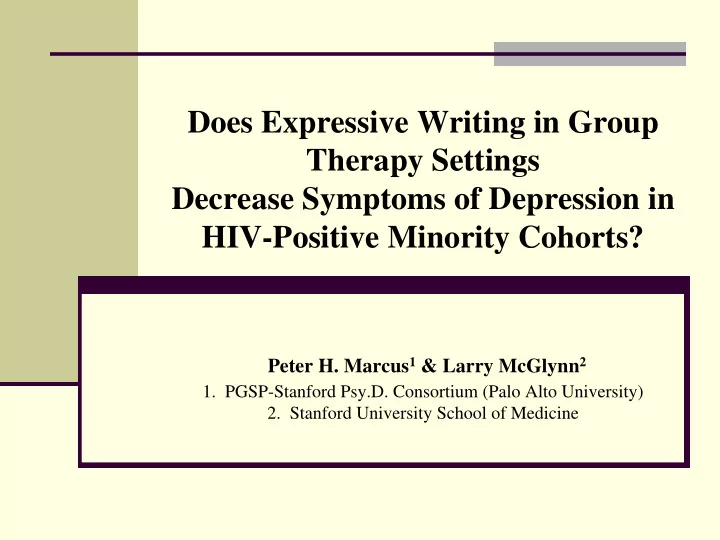

Does Expressive Writing in Group Therapy Settings Decrease Symptoms of Depression in HIV-Positive Minority Cohorts? Peter H. Marcus 1 & Larry McGlynn 2 1. PGSP-Stanford Psy.D. Consortium (Palo Alto University) 2. Stanford University School of Medicine
How we began… Latinos are a significant minority population in San Jose, CA … And represent 54% of the population of the Ira Green PACE Clinic at Santa Clara Valley Medical Center Latino individuals are over-presented in HIV/AIDS populations HIV-infection represents a significant risk-factor for symptoms of depression Depressed Latinos are less likely to seek treatment for their depression AND therefore less likely to take their HIV medications We need to reach this population!
The Writing Prompts 1. Write about first testing (first finding out you were) HIV positive. 2. Write about revealing your HIV status to others. 3. Write a letter to your HIV. 4. Write about your doctor ’ s visits. 5. Write about getting routine test results/conversations with health care providers over the course of having HIV. 6. Write about one thing or multiple things HIV has changed in your life. 7. Write about your vision of your future. 8. Write your thoughts and feelings about this experience of reflecting on different aspects of HIV for the past 7 weeks.
The Writing Prompts: Additional Instructions “ Although you can write about any aspect of the topic you wish, I would like you to pay close attention to the feelings and emotions you experienced during the time you are writing about. More than anything else, focus on and describe the feelings and emotions that are related to the topic. ”
After the writing is complete…. 60 minutes of group discussion/therapy follows the writing (and a very short break) and begins each week with the simple, single question: “ What did you discover in your writing? ” The work of the group facilitator/RA is to focus on and reframe, if necessary, participant responses to the emotional content of what they have written. The facilitator often has to work with each respondent to uncover the emotional content of the writing.
DASS DEPRESSION SCORES 45 40 35 PT_1.1 30 PT_1.3 PT_1.5 PT_2.2 PT_2.3 25 PT_2.4 Score PT_3.4 PT_4.3 20 PT_5.1 PT_5.2 PT_5.3 15 PT_5.4 PT_5.5 10 5 0 week 1 week 8 Week
Factors to consider…. The 8-week commitment may be intimidating to participants and contribute to protocol nonadherence; Consider how long participants have been living with HIV infection -- you may wish to put groups together with individuals who have been living with HIV for similar periods of time, to the degree it is possible; “ Parenting ” of one or several group members over others can be initially viewed as empathetic and caring, but is actually a form of avoidance addressing emotional content; Multiple biopsychosocial issues can prevent participants from attending all 8 sessions; Ground rules are important: no in-group dating during the 8- weeks; do not ask prior group members for the writing prompts; Pay close attention to those participants who express emotion, and those who do not.
Salient Themes Loss of control “ I used to live an out-of-control life, now it ’ s out of control because of my HIV. ” Social isolation: “ I don ’ t want to be with people, HIV seems to always come up. ” Secrecy: “ My family doesn ’ t know. ” Finding partners: “ It ’ s hard to know when to bring “ it ” up – there ’ s never a good time. ” “ Hooking up ” – “ I check out Craigslist, they can ’ t all be HIV negative ” Death: “ So many of my friends from when I was younger aren ’ t around anymore. ” Finding future: “ I want to go back and finish school. ”
References Centers for Disease Control, (2011). HIV among Latinos. National Center for HIV/AIDS, Viral Hepatitis, STD and TB Prevention, Division of HIV Prevention. Retrieved from: http://www.cdc.gov/hiv/latinos/index.htm Gonzalez, J. S., Batchelder, A. W., Psaros, C. & Safren, S. A. (2011). Depression and HIV/AIDS treatment nonadherence: A review and meta- analysis. Journal of Acquired Immune Deficiency Syndromes, 58, 181-187. Gortner, E., Rude, S. S., & Pennebaker, J. W. (2006). Benefits of expressive writing in lowering rumination and depressive symptoms. Behavior Therapy, 37, 292-303. Kelly, J. A., Murphy, D. A., Bahr, R., Kalichman, S. C., Morgan, M. G., Stevenson, L. Y., Koob, J. J., Brasfield, T. L., & Bernstein, B. M. (1993). Outcome of cognitive-behavioral and support group brief therapies for depressed, HIV-infected persons. American Journal of Psychiatry 150, 1679- 1686. Lovibond, S.H. & Lovibond, P.F. (1995). Manual for the Depression Anxiety Stress Scales (2nd. Ed.). Sydney: Psychology Foundation. Pennebaker, J. W., & Beall, S. K., (1986). Confronting a traumatic event: Toward an understanding of inhibition and disease. Journal of Abnormal Psychology, 95, 274-281. Rivkin, I. D., Gustafson, J., Weingerten, I., & Chin, D. (2006). The effects of expressive writing on adjustment to HIV. AIDS and Behavior, 10, 13-26.
Recommend
More recommend